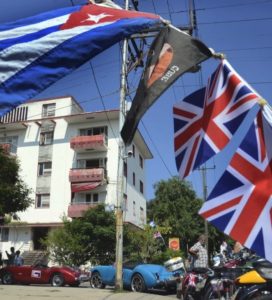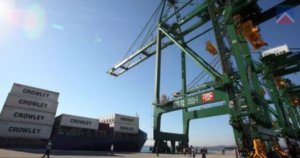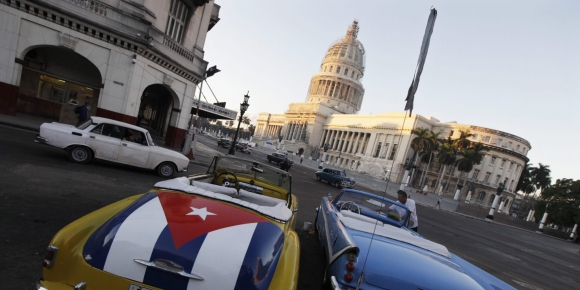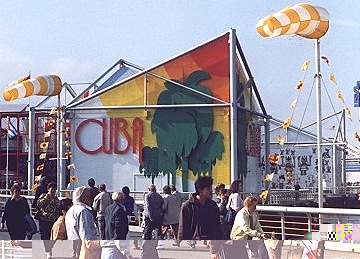 (OPINIÓN) LA BUROCRACIA, FALTA DE PAGO E INSEGURIDAD JURÍDICA JUEGAN CONTRA CUBA.
(OPINIÓN) LA BUROCRACIA, FALTA DE PAGO E INSEGURIDAD JURÍDICA JUEGAN CONTRA CUBA.
Con la 36 edición de la Feria Internacional de La Habana (Fihav), las autoridades quieren ofrecer la imagen de un país abierto al capital extranjero en medio de un panorama especialmente complicado para la economía cubana, que se enfrenta de nuevo al reto de atraer a un mayor número de empresarios foráneos a la Isla para solventar la crisis de liquidez.
Tras la aprobación de una ley de inversión extranjera en 2014, los empresarios han sido muy tímidos y, en lugar de los 2.000 millones de dólares anuales que el Gobierno esperaba, solo habían llegado 1.300 millones a finales de 2016.
En 2017 las autoridades anunciaron que habían logrado cerrar acuerdos por valor de 2.300 millones en inversión durante ese ejercicio de los que no se conocieron más detalles ni hasta la fecha han hecho nada para levantar la economía aquejada por los recortes en los envíos petroleros desde Venezuela y las abultadas deudas con numerosos acreedores.
La lentitud en la aprobación de las inversiones lastra la llegada de efectivo, a lo que se le suma una compleja burocracia en la que “hay muchos funcionarios de tercera o cuarta que no deciden nada pero hacen perder mucho tiempo”, prosigue el italiano que prefirió guardar el anonimato.
El empresario asegura que, ahora mismo, la parte cubana le debe “cientos de miles de dólares” en pagos atrasados, pero que ha seguido importando mercancia a la Isla a la espera de poder recuperar su dinero y mantenerse en el país con la mirada puesta en el futuro.
En una entrevista con la prensa oficial, el Ministro de Comercio Exterior y la Inversión Extranjera de Cuba, Rodrigo Malmierca Díaz, insistió en la protección de la soberanía en la política de inversiones. “Nosotros, sin embargo, no vamos a vender el país. Nosotros vamos a desarrollar este proceso de acuerdo con nuestras leyes, y con nuestras políticas”, advirtió.
Malmierca llamó a no desesperarse ante los lentos resultados de la ZEDM y aclaró que “está concebida para un desarrollo de largo plazo” y es “un proyecto para 50 años de desarrollo”. Sus declaraciones han aumentado el escepticismo entre los cubanos, cansados de esperar porque la economía experimente un repunte.
La obra insignia del expresidente Raúl Castro, la Zona Especial de Desarrollo de Mariel (ZEDM), tampoco ha brindado los frutos esperados. Hasta el momento el lugar cuenta con inversiones procedentes de 15 países y 37 proyectos de negocios aprobados, mucho menos de lo proyectado.
El aumento del desabastecimiento de alimentos, la subida de los precios de los productos agrícolas y las nuevas restricciones para el sector privado complican aún más el escenario interno de la Isla.
Expocuba, creada como vitrina en los años 80 durante la mayor aproximación a la Unión Soviética, acoge estos días a 2.500 empresarios de más de 60 países y también la presencia del mandatario Miguel Díaz-Canel, quien realizó el discurso inaugural y ha desarrollado una intensa agenda de encuentros con representantes de delegaciones, entre ellos el vicepresidente venezolano Tareck El Aissami, y Yuri Borísov, viceprimer ministro de la Federación Rusa.
España es el país más representado en Fihav con 112 empresas, 63 de ellas agrupadas en el pabellón oficial, 29 en el pabellón del País Vasco y una veintena distribuidas en el resto del perímetro expositivo. La presencia peninsular está acompañada por el recién nombrado embajador, Juan Fernández Trigo y se produce a pocos días de la llegada del presidente del Gobierno español, Pedro Sánchez, a la Isla.
EMPRESA ESTATAL SOCIALISTA SIGUE DOMINANDO EL PAISAJE DE CUBA.
El economista cubano Elías Amor, radicado en España, tienen una opinión muy crítica sobre la Fihav. “Si la economía cubana quiere exportar más, debe olvidarse de fiestas y ferias y dedicarse a aumentar la productividad”, sentencia en su blog Cubaeconomía. Elías Amor recomienda “producir mejor y saber vender lo que se produce, hay que cualificar a la población laboral, introducir tecnologías modernas y hacer las cosas bien y no más baratas”. Para el especialista, la Isla “necesita aumentar sus exportaciones de productos si quiere corregir el grave déficit en sus cuentas externas”, pero desde 2011 la cifra de ventas al exterior “no ha hecho más que descender” en una caída nominal del 59%.
La mastodóntica empresa estatal socialista sigue dominando el paisaje económico de la Isla, donde también la existencia de una dualidad monetaria frena a muchos interesados en invertir. La falta de pago y la inseguridad jurídica son otros de los motivos que disuaden a muchos empresarios extranjeros de poner su dinero en el país.
Para el economista Omar Everleny Pérez, no basta con una legislación más flexible para favorecer la llegada de capital foráneo sino que se necesita “una nueva mentalidad en la orientación de los decisores económicos y de riesgos que se deben tomar necesariamente para que Cuba se incorpore a los circuitos internacionales de comercio e inversión”.
Recientemente el Gobierno de La Habana realizó un pequeño pago de la tercera cuota de una deuda renegociada de 2.600 millones a 14 países. El monto inicial de 11.100 millones se reestructuró para ser pagado hasta 2033, de lo cual ya se han abonado 60 millones de dólares en 2017 y cerca de 70 en lo que va de 2018.
La Fihav se desarrolla también en medio de los debates en los barrios y centros laborales en los que se discute el proyecto de reforma constitucional. Uno de los puntos más cuestionados en el texto ha sido, justamente, el que no se incluya a los nacionales entre los empresarios que pueden invertir en la Isla.
Numerosas voces se han alzado a lo largo de la Isla para exigir que se reconozca el derecho a los cubanos residentes dentro y fuera del país a invertir en la industria, el turismo, los servicios y otros sectores claves.
 (OPINION) THE BUREAUCRACY, LACK OF PAYMENT AND LEGAL INSECURITY PLAY AGAINST CUBA.
(OPINION) THE BUREAUCRACY, LACK OF PAYMENT AND LEGAL INSECURITY PLAY AGAINST CUBA.
With the 36th edition of the International Fair of Havana (Fihav), the authorities want to offer the image of a country open to foreign capital in the midst of a particularly complicated scenario for the Cuban economy, which faces the challenge of attracting a greater number of foreign businessmen to the Island to solve the liquidity crisis.
After the approval of a law of foreign investment in 2014, the businessmen have been very timid and, instead of the 2,000 million annual dollars that the Government hoped, they had only arrived 1,300 million at the end of 2016.
In 2017, the authorities announced that they had managed to close agreements worth 2,300 million in investment during that year, which did not know more details and to date have done nothing to lift the economy affected by the cuts in oil shipments from Venezuela and the bulging debts with numerous creditors.
The slowness in the approval of investments hampers the arrival of cash, which is compounded by a complex bureaucracy in which “there are many third or fourth officers who decide nothing but make a lot of time,” continues the Italian who preferred save anonymity
The businessman assures that, right now, the Cuban side owes him “hundreds of thousands of dollars” in back payments, but that he has continued importing merchandise to the Island in the hope of being able to recover his money and stay in the country with his eyes on in the future.
In an interview with the official press, the Minister of Foreign Trade and Foreign Investment of Cuba, Rodrigo Malmierca Díaz, insisted on the protection of sovereignty in investment policy. “We, however, are not going to sell the country, we are going to develop this process according to our laws and our policies,” he warned.
Malmierca called to not despair before the slow results of the ZEDM and clarified that “it is conceived for a long-term development” and is “a project for 50 years of development”. His statements have increased skepticism among Cubans, tired of waiting for the economy to rebound.
The flagship work of former President Raúl Castro, the Mariel Special Development Zone (ZEDM), has not provided the expected results either. So far the place has investments from 15 countries and 37 approved business projects, much less than projected.
The increase in the shortage of food, the rise in the prices of agricultural products and the new restrictions for the private sector further complicate the internal scenario of the Island.
Expocuba, created as a showcase in the 80s during the closest approach to the Soviet Union, welcomes 2,500 businessmen from more than 60 countries and also the presence of President Miguel Diaz-Canel, who made the opening speech and has developed an intense agenda of meetings with representatives of delegations, including Venezuelan Vice President Tareck El Aissami, and Yuri Borisov, Deputy Prime Minister of the Russian Federation.
Spain is the most represented country in Fihav with 112 companies, 63 of them grouped in the official pavilion, 29 in the pavilion of the Basque Country and twenty distributed in the rest of the exhibition perimeter. The peninsular presence is accompanied by the newly appointed ambassador, Juan Fernández Trigo, and occurs a few days after the arrival of the Spanish Prime Minister, Pedro Sánchez, to the island.
THE MAMMOTH SOCIALIST STATE ENTERPRISE CONTINUES DOMINATING THE ECONOMY.
The Cuban economist Elías Amor, based in Spain, has a very critical opinion about Fihav. “If the Cuban economy wants to export more, it must forget about festivals and fairs and dedicate itself to increasing productivity,” he writes in his blog Cubaeconomía. Elías Amor recommends “produce better and know how to sell what is produced, we must qualify the workforce, introduce modern technologies and do things well and not cheaper.” For the specialist, the island “needs to increase its exports of products if it wants to correct the serious deficit in its external accounts”, but since 2011 the sales figure abroad “has only fallen” in a nominal fall of 59%.
The mammoth socialist state enterprise continues to dominate the economic landscape of the island, where also the existence of a monetary duality restrains many interested in investing. Lack of payment and legal insecurity are other reasons that discourage many foreign entrepreneurs from putting their money in the country.
For the economist Omar Everleny Pérez, a more flexible legislation is not enough to favor the arrival of foreign capital but “a new mentality is needed in the orientation of economic decision makers and of risks that must necessarily be taken for Cuba to join the international circuits of commerce and investment “.
Recently the Government of Havana made a small payment of the third installment of a renegotiated debt of 2,600 million to 14 countries. The initial amount of 11,100 million was restructured to be paid until 2033, of which 60 million dollars have already been paid in 2017 and close to 70 so far in 2018.
The Fihav also takes place in the middle of the debates in the neighborhoods and work centers where the constitutional reform project is discussed. One of the most questioned points in the text has been, precisely, the one that does not include nationals among entrepreneurs who can invest in the Island.
Numerous voices have been raised throughout the island to demand recognition of the right of Cubans residing inside and outside the country to invest in industry, tourism, services and other key sectors.
Agencies/14ymedio, La Habana/ Extractos/ Internet Photos/ Arnoldo Varona/ TheCubanHistory.com
THE CUBAN HISTORY, HOLLYWOOD.






